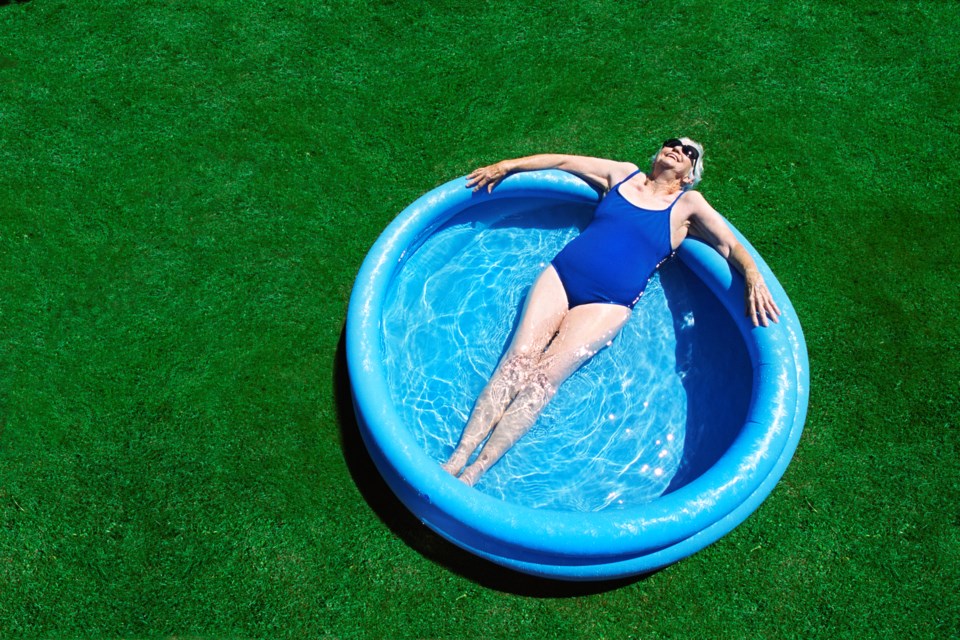Look out for seniors, young children and other vulnerable people today.
Fraser Health and Vancouver Coastal Health officials are issuing that reminder in light of a continued heat warning over Metro Vancouver, Howe Sound and the Fraser Valley. Municipalities, including New Westminster and Burnaby, have opened their cooling centres for the duration of the heat event.
A strong ridge of high pressure has brought a short-lived heat wave to British Columbia, with daytime high temperatures of 29 to 35 C inland and approaching 27 C near the water. Temperatures are expected to moderate tomorrow (Friday).
In the meantime, however, health officials say this brief heat event — the fourth officially recorded one of the season — isn't expected to have wide-ranging health impacts on the general public. However, they're asking people to check in on those who may be vulnerable to heat illness:
- seniors aged 65 years or older;
- people who live alone;
- people with pre-existing health conditions such as diabetes, heart disease or respiratory disease;
- people with mental illness such as schizophrenia, depression or anxiety;
- people with substance use disorders;
- people who are marginally housed;
- people who are pregnant;
- infants and young children;
- people with limited mobility or other disabilities.
The health authorities are also offering some other tips for living with the heat.
How to stay cool if you don't have air conditioning
- Find somewhere you can cool off on hot days — such as libraries, community centres, movie theatres or malls. Also consider outdoor spaces with lots of shade and running water.
- Shut windows and close curtains and blinds during the heat of the day to block the sun and prevent hotter outdoor air from coming inside. Open doors and windows when it is cooler outside to move that cooler air indoors.
- Ensure you have a working fan, but don't rely on fans as your primary means of cooling. Fans can be used to draw cooler late-evening, overnight and early morning air indoors. Keep track of temperatures in your home using a thermostat or thermometer. Sustained indoor temperatures over 31 C can be dangerous for people who are susceptible to heat.
- If your home gets very hot, consider staying with a friend or relative who has air conditioning if possible.
- Identify people who may be at high risk for heat-related illness. If possible, help them prepare for heat and plan to check in on them.
How to take care of your health in the heat
- Drink plenty of water and other liquids to stay hydrated, even if you are not thirsty.
- Spray your body with water, wear a damp shirt, take a cool shower or bath, or sit with part of your body in water to cool down.
- Take it easy, especially during the hottest hours of the day.
- Stay in the shade and use a broad-spectrum sunscreen with SPF 30 or more.
- Take immediate action to cool down if you are overheating. Signs of overheating include feeling unwell, headache and dizziness. Overheating can lead to heat exhaustion and heat stroke.
- Signs of heat exhaustion include heavy sweating, severe headache, muscle cramps, extreme thirst and dark urine. If you are experiencing these symptoms, you should seek a cooler environment, drink plenty of water, rest and use water to cool your body.
- Signs of heat stroke include loss of consciousness, disorientation, confusion, severe nausea or vomiting and very dark urine or no urine. Heat stroke is a medical emergency.
- In the event of a medical emergency, call 911. However, it is important to use 911 responsibly to avoid overwhelming the system.
Heat and other emergencies: When to call 911
- In cases of heat stroke: loss of consciousness, disorientation, confusion, severe nausea or vomiting or very dark urine or no urine.
- In general: when there is chest pain, difficulty breathing, loss of consciousness, severe burns, choking, convulsions that are not stopping, a drowning, a severe allergic reaction, a head injury, signs of a stroke or a major trauma.
If you have a less urgent health issue
- You can call HealthLinkBC at 811 and speak with a nurse or go to an urgent care centre or clinic if you can do so safely. That way, emergency medical dispatch staff and paramedics will be available for people who need their services the most.
- There are also online tools at healthlinkbc.ca, including a “Check Your Symptoms” tool.
Check out resources from Vancouver Coastal Health and Fraser Health for more information about the health impacts of heat, and tips and resources to help stay safe and cool.
Follow Julie MacLellan on Twitter @juliemaclellan.
Email Julie, [email protected]



